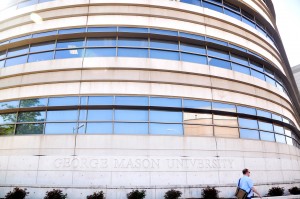Up Close and Personal: GMU School of Law
August 8, 2010
Now and Then – A Profile of the GMU School of Law
The still silence that I had expected turned out to be a studious low hum of students collected in small groups. It perforated throughout the hall upon entering George Mason University’s School of Law.
The School of Law resides in a uniquely shaped, four-story building sitting at the corner of Mason’s Arlington Campus. Within its hallowed walls sits Christine Malone, the director of Student Academic Affairs. Malone, a graduate of the School of Law in 2000, was a law clerk for two years for Fairfax Circuit Court Judge Leslie M. Alden (also a Mason Law alum) and practiced litigation after that at Richards, McGettigan, Reilly, & West. She moved back to Mason in 2004 to assist the Career Services office and to support the school’s second-year Legal Research, Analysis and Writing program. She also co-taught an appellate advocacy course and worked in the alumni office before holding her current position for the past three years.
Mason’s School of Law was actually started as the International School of Law by Dean John W. Brabner-Smith in 1972, and was originally located in Washington, D.C. The International School of Law relocated to Arlington, Va. in 1977 and in 1979, there was a push to merge with Mason. The School of Law, which once resided in the Original Building where the School of Public Policy is now located, integrated with the rest of the programs later that year. In January 1999, it moved across the parking lot to a new building in Arlington (later named Hazel Hall), which contains four stories of classrooms and administrative offices, a three-story library and two levels of parking.
The school contains upwards of 800 students, and the incoming class last fall contained 247 students. The student body is a diverse community: There are slightly more males (53 percent) than females (47 percent). Students come from all walks of life: some enter straight out of undergrad, while others are older, looking for a second career. Many enter the full-time program, in which you can work no more than 20 hours outside the law program. There are various groups that students are able to take part in that represent different political, religious and ethnic backgrounds, and students can take advantage of community life through, for example, events such as happy hours.
The student body is small enough that students can maintain close relationships with their professors and with each other. Students are divided up into sections, and will stay with that section until they finish the program. The School of Law has one of the highest bar exam passage rates in the State of Virginia, clocking in at 90.6 percent, ten points higher than the state average.
After inquiring how the School of Law fits in with the overall Arlington Campus community, Malone remarked how it’s a challenge for the community to come together. There are very different programs and you have full-time students versus part-time students on campus; the difficulty is that everyone does different things. The School of Law offers opportunities that are available for all students. One advantage is that there are many ways in which law and policy overlap, which can potentially lead to a closer community, and the new building may offer ways of bringing the two groups closer together.
“If there is a law student sitting outside at a table and the people next to them are public policy students, somebody might hear something and engage in conversation, and that just doesn’t happen that much right now,” said Malone. We’re all sort of in our own little spaces.”
Despite the spaces, the Law Library and its resources are a shared facility. “The library is three stories tall and contains 488,994 volumes,” said Deborah Keene, the dean of the Law Library.
However, with all this space, they still didn’t have enough room for their entire collection, and the Original Building library still houses some volumes. Most importantly, the library is open for access to all students at Mason and the public at large. Public Policy students can visit the library at any time and take advantage of their large collection of material, as well as their various databases and labs.
Why should a prospective student think about Mason’s School of Law? The tight-knit community and small class sizes allow for plenty of interaction with colleagues and professors. The professors are open to their students, and maintain great relationships with them, participating in various events the school holds, including an event where the professors were dealers for a casino night and all the money went to charity. The School of Law maintains an excellent reputation outside of its walls, and its unique perspective on law make it a school where you can truly get the best “bang for your buck” and receive an excellent preparation for practicing law.
Daniel Jeskey, Stylus Correspondent

Walkin' by GMU School of Law...Can't Miss it! Photo by Annabelle Ombac